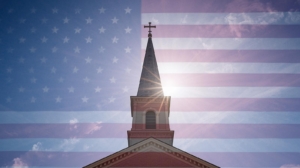In the wake of the disaster that was World War I, in which about 8.5 million military personnel died and an even greater number of civilians died, there developed in this country and in Europe a desire not only for a future . . . Continue reading →
Twofold Kingdom
Oklahoma Governor Claims State For Christ. Controversy Ensues
After his re-election as governor of the State of Oklahoma, the hon. Kevin Stitt appeared at a prayer rally. He said the following: STITT: “Father, we just claim Oklahoma for you. Every square inch, we claim it for you in the name . . . Continue reading →
What Can We Do With Natural Law?
The two principal reasons the Heidelblog exists (and its parent organization, the Heidelberg Reformation Association) are, first, to encourage Reformed confessing Christians to recover their confession, i.e., both the confessional documents but also the broader and classic Reformed theology, piety, and practice, . . . Continue reading →
Christian Nationalism Might Be Cosplay: The Babylon Bee Interview
R. Scott Clark interviewed on the Babylon Bee Podcast about Christian Nationalism, Christ and Culture, Baptism, Calvinism and More Continue reading →
How Will Protestants Maintain Orthodoxy In A Changing America?
It is now clear that orthodox Protestants, specifically evangelicals, do not own the country. Whether they ever did is a matter for debate; that they thought they did is indisputable. It serves to explain, for example, the rather odd (from an English . . . Continue reading →
Should the State Imitate the Church?
One of our readers named K wrote me to ask, “If God’s Word forbids women from teaching and exercising authority, why shouldn’t the state follow the same principle?” This is a good and interesting question. It is made even more complicated by . . . Continue reading →
On The Gospel And Social Justice With Chris Gordon
Only someone in an isolation chamber could imagine that this world is not fallen. Even the most fact-resistant naturalist (who cannot begin to explain why there is something rather than nothing) concedes that the evolutionary process in which he places so much . . . Continue reading →
Beyond Fundamentalism And Feminism
Back in May 2007, Carl Trueman raised the problem of the pressures females feel in conservative evangelical and Reformed churches. This issue raises the question of how Reformed Christians ought to relate to the broader culture. How do we live in a . . . Continue reading →
Was the Reformation a Big Misunderstanding?
The socially conservative evangelicals do not have a doctrine of a twofold kingdom; nor do they typically distinguish between nature and grace or between the sacred and the secular. Thus the only way they can cooperate with Roman Catholics on social questions is to get them converted and baptized. Continue reading →
World And Life View: License to Baptize? (Part 1)
James Bond, Agent 007, had a “license to kill.” There are Reformed folk who also seem to have a license of some sort or other, based on what they call “the Christian world and life view” (hereafter, CWLV). This concept is interesting . . . Continue reading →
World And Life View: License To Baptize? (Part 2)
The concept of a worldview is essential. Derived from the German Weltanschauung, the English noun denotes “a particular philosophy of life or conception of the world.”1 Worldviews are like belly-buttons. Everyone has one. Continue reading →
World And Life View: License To Baptize? (Part 3)
In an essay dated 1 March 1996, Fred Pugh sketches what has become a fairly standard view among many neo-Kuyperians.1 His account probably obviously leans to the cultural-political right, and the antithesis is established as “secular humanism.” Continue reading →
On The Distinction Between BBQ And The Kingdom Of God
All my reading material was on my computer, so on the way into the air and on the way down I read the American Airlines American Way magazine.1 It is not often that one finds stories about churches in the in-flight mag, but . . . Continue reading →
Strangers, Exiles, And Civil Religion
Since most of us have grown up with the Thanksgiving Holiday, it is easy for us to assume that this is the way things are and should be, but it has not always been so nor is it necessarily so. The American . . . Continue reading →
Fisher’s Catechism On Distinction Between The Special And General Kingdoms
James Fisher published a widely-read (and oft-reprinted) Exposition of the Shorter Catechism (1753). Ebenezer Erskine and others of the “Marrow Men”—that is, those who were the gospel-men in eighteenth-century Scotland (as opposed to the moralists of the time)—were also associated with it. . . . Continue reading →
Christian Banking?
Planet Money is an interesting and usually fair-minded (they talk to Keynesians and to free-market capitalists) account of economic theory and the global economy. Their most recent podcast was a story about a Spanish savings bank called cajas de ahorros.1 It is . . . Continue reading →
On Theocracy
I have explained at great length here why those who deny our covenant theology, our hermeneutics, and our doctrine of the sacraments are not Reformed. All the Reformed confessions of the sixteenth and seventeenth centuries teach paedobaptism and denounce the rejection of . . . Continue reading →
Natural Law and Light in the Reformed Confessions
In the modern period, particularly in the twentieth century, many Reformed folk became uneasy with the traditional Reformed language concerning natural law. As one who began to enter the Reformed world circa 1980, I mostly found Reformed people to be hostile to . . . Continue reading →














